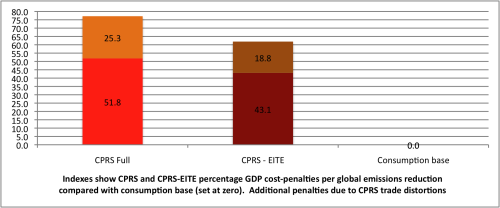The Senate Select Committee on Climate Policy wanted modelling answers for all six options it discussed (CPRS included). This is prudent (i) to ensure we have the lowest-cost policy, and (ii) to ensure all models are transparent and peer-reviewable.
The preliminary Access Economics analysis is aimed at this wider debate. The authors note that more work is needed.
I suggest three reasons why the consumption model should be considered as one option in this wider debate.
Advertisement
First, preliminary modelling suggests it could be 50 per cent more cost-effective than the CPRS in reducing Australian greenhouse gas emissions (see Charts 1 and 2).
Second, it should be even cheaper in reducing global greenhouse gas emissions than the CPRS, because, unlike the CPRS, it also reduces Australian imports of such emissions and eliminates “carbon leakage” from Australia (see Chart 3).
Third, by eliminating “carbon leakage” (due to lost trade competitiveness) as a reason not to act, this model could be a template for all countries. By eliminating trade competitiveness concerns, it greatly improves chances of securing a global deal.
This third consideration is crucial.
Without a global deal, Australia’s efforts to reduce its own emissions (no matter how large or small) matter little in the global scheme of things.
We’re too small on the absolute emitters scale.
Advertisement
Chart 3. Cost-penalty indexes, CPRS, CPRS-EITE and consumption bases, 2020, global effects

Source: Based on Access Economics’ preliminary modelling results for CEDA (derived from Table 4.2, page 15).
In the next couple of months, how about a thorough quantitative analysis managed by the Productivity Commission, incorporating the best modelling available (private and public), covering the range of policy options considered by the Senate Select Committee?
We have time to get it right. We’re not debating emissions reduction targets here. We’re just looking at how best to hit them.
We’ll have plenty of time to regret our mistake if we get the policy design wrong.
Discuss in our Forums
See what other readers are saying about this article!
Click here to read & post comments.
6 posts so far.